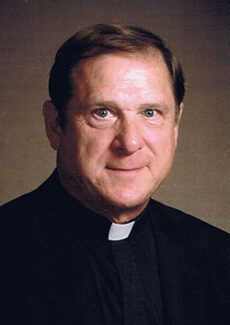The one goal of all prayer — whether praise, contrition, petition, thanksgiving

Father R. Michael Schaab
By Father R. Michael Schaab
Thirtieth Sunday in Ordinary Time/Oct. 27
Sirach 35:12-14,16-18; Psalm 34:2-3,17-18,19,23; 2 Timothy 4:6-8,16-18; Luke 18:9-14
—
Today’s readings have much to say about prayer. The traditional division of prayer into Praise, Contrition, Petition and Thanksgiving can help us address the topic.
The easiest to address is Praise. The Psalm states, “I will bless the Lord at all times; his praise shall be ever in my mouth.” The saints spent hours doing it and we are drawn to it as we walk outside and take in the bright colors of autumn. It seems to be the most natural of all faith responses. We recognize goodness and beauty and we are easily moved to respond by praising the source of all goodness.
Contrition is obviously uppermost in the mind of Jesus as he tells the parable about the Pharisee and the tax collector praying in the Temple. We are told that the Pharisee “spoke this prayer to himself. ‘O God, I thank you that I am not like the rest of humanity.’” Today we would call his prayer an ego trip. In it he uses the pronoun “I” four times. There’s really no room for God. It’s all about “me.”
The tax collector, however, prayed, “O God, be merciful to me a sinner.” His was a humble prayer of contrition, and because of it “he went home justified.” As a matter of fact, his prayer becomes a definition for contrition. “The one who humbles himself will be exalted.”
The first reading from the Book of Sirach is filled with that form of prayer known as Petition. “The one who serves God willingly is heard; his petition reaches the heavens.” The petition may come from the weak, the oppressed, the widow or the orphan. The Lord hears the cry of the oppressed.
GOD IS STEADFAST
It’s interesting that the prayer of “the one who serves God willingly is heard.” What about the petitions of those who do not serve God? There seems to be some connection between the kind of life we live and the efficacy of our prayers. The psalmist seems to reinforce this when he states, “When the just cry out, the Lord hears them.” What about the cry of the unjust? Prayer and the way we live our lives are intertwined. We cannot separate our morality and our spirituality.
Another interesting connection is between my prayer and others’ needs. Often we tell someone that we’ll pray for them, and so we do. But sometimes we later wonder, what good are my prayers for someone else? When the psalmist speaks about the prayers of praise he explains how our prayers affect others. “Let my soul glory in the Lord; the lowly will hear me and be glad.” Somehow my prayers to God bring joy to others. My prayers make the lowly glad. How that happens, he does not say.
The fourth division of prayer is Thanksgiving, and that brings us to the second reading from Paul’s second letter to Timothy. It begins with Paul summing up his life and ministry in four lines. Like the prayer of the Pharisee in the Temple, Paul uses “I” four times, but unlike the Pharisee this is not an ego trip. Rather, Paul is laying out the reason for his thanking God. After listing the many challenges he has had to face, Paul simply states, “the Lord stood by me and gave me strength.” It’s noteworthy that Paul doesn’t say that the Lord heard all his petitions and took away all his troubles. Rather, he thanks God for never abandoning him and always being there to give him the strength he needed to carry the cross that he was facing.
One final thought about prayers of thanksgiving — somehow they apply to the future as much as to the past. Paul says, “I was rescued from the lion’s mouth” and “the Lord will rescue me from every evil threat.” He thanks God for help in the past and professes his faith that God will be there in the future, not to take away troubles but to protect him from evil as he faces those troubles.
For Paul, all prayer — Praise, Contrition, Petition and Thanksgiving — is wrapped up in one goal. God “will bring me safe to his heavenly kingdom. To him be glory forever and ever. Amen.”
–=
Father R. Michael Schaab is a senior priest of the Diocese of Peoria who gives retreats and days of recollection, and who fills in as presider at parish Masses on weekends. He resides on a hobby farm in Putnam County.





